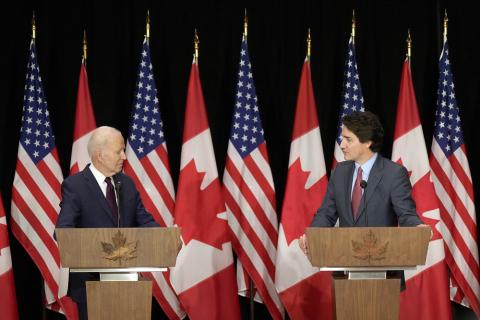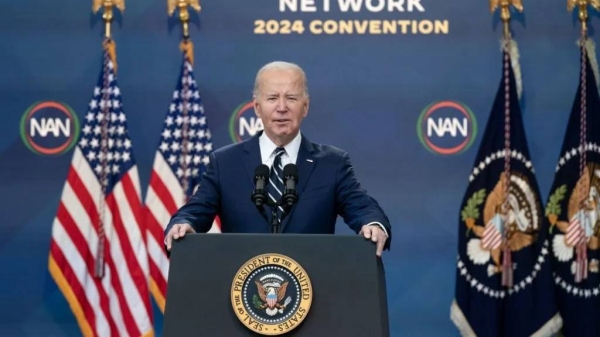
It’s generally accepted in Washington that once-buoyant hopes for the emergence of a free, democratic China, initially sparked by Richard Nixon’s groundbreaking 1972 visit, have sunk without trace. President Xi Jinping’s regime is now described as a “systemic rival”, “strategic competitor” or outright “threat”. The EU, Nato, the UK, and regional allies broadly agree: the era of engagement is over.
What’s lacking is agreement over what comes next. The hole where common policy and joint action should be gapes ever more dangerously amid almost daily collisions on multiple fronts with Xi’s aggressive, authoritarian one-party state. If it’s not about human rights abuses, cyberhacking, or trade, it’s Taiwan, visas, spying, maritime disputes, the Indian border, or alleged hostage-taking.
Sooner or later, an explosion will occur. Yet substituting confrontation for engagement is reckless and futile if the west is not prepared to put its money, political muscle and ultimately its armed forces where its mouth is. Xi has a plan to make China great again and is ruthlessly determined to fulfil it. A similar degree of shared western commitment and unity of purpose is signally absent.
For Mike Pompeo, Donald Trump’s secretary of state and a likely Republican presidential candidate in 2024, the challenge is existential. As he tells it, a fanatical Marxist-Leninist Chinese communist party is engaged in an “ongoing drive to replace America as the world’s true great power and establish [its] model of governance as the norm for all nations”.
This is an exaggeration. Pompeo is a hard-right evangelical Christian who blithely divides the world into good and evil. But on China, he claims to speak for most Americans, including Democrats – and recent polling supports him. “The CCP under Xi presents the single greatest external threat to our way of life,” he warns. Bent on global domination, “[China] is at war with the west to crush our ideology of freedom.”
One of the big surprises of the past six months is that President Joe Biden seems broadly to agree. In describing a fundamental, worldwide battle between democracy and dictatorship, he has been much tougher than expected on Beijing. “US-China relations are already at their worst point in decades, and the administration’s strikingly confrontational approach is likely to make things worse,” says analyst Jonathan Tepperman.
In a series of unilateral moves, Biden set limits on business and investment while retaining Trump’s trade sanctions. New penalties have been imposed over Hong Kong and Xinjiang. He aims to match or beat Xi’s Belt and Road global infrastructure masterplan and Covid vaccine diplomacy. And he has ordered the Pentagon to increase readiness for future military conflict.
Tepperman argues that Biden’s approach is proving counter-productive. “[His] combative stance has alienated Beijing, thereby lowering its already limited willingness to collaborate on key global issues such as climate, arms control, and preventing future pandemics,” he says.
John Kerry’s appeal last week for swifter Chinese action on carbon emissions may be an early casualty of rising hostility. Likewise, Biden’s framing of the overall argument in crude ideological terms – as liberty versus tyranny – risks further alienating Beijing from the western-led, rules-based international order he desperately wants to uphold.
Yet Biden’s biggest weakness – of which Xi is doubtless aware – is a lack of solidarity among US allies whose support is vital for his policy’s success. How to agree practical ways to stand up to China is a question with numerous, conflicting answers, depending on where you sit in the world. The resulting dilemma is what Pentagon officials pithily call the “say-do gap”.
Last week saw Biden’s biggest advance on the “say” side: a joint statement endorsed by all 30 Nato members, plus the EU, Australia, New Zealand and Japan, condemning “malicious” Chinese cyberattacks, such as the recent Microsoft Exchange software hack. For the first time, he lined up European and Asian-Pacific democracies, plus the world’s foremost military alliance, in stark verbal opposition to Beijing.
Yet the success of this demarche (which infuriated the Chinese) was an exception. Since taking office, Biden has used the G7 and Nato summits, the revived Quadrilateral Security Dialogue (the US, Japan, Australia and India), the Five Eyes intelligence alliance, and talks with national leaders to try to develop a tougher, united China front.
The results are decidedly mixed. Germany is sympathetic, but is unwilling to jeopardise its large manufacturing export trade. Downplaying human rights concerns, Angela Merkel’s likely successor as chancellor, Armin Laschet, asks: “Do we need a new adversary?” In France, a sceptical, Europe-focused President Emmanuel Macron asks: do we need a new cold war?
Without its two biggest players fully on board, the EU, despite castigating Beijing, is effectively hamstrung. In any case, several other member states, notably Hungary, Greece and Italy, depend on Chinese investment, having despaired of Berlin’s perceived indifference to their financial pain. China can and does exploit these European divisions.
Nato members are in two minds, too, about getting involved in an unpredictable superpower struggle. Following its biggest-ever out-of-area engagement, in Afghanistan – which did not end well – Nato is conducting a “forward-looking reflection process” about its future role. It wonders, with good reason, whether a North Atlantic-centred defensive alliance has any business in the Asia-Pacific. For reflection, read indecision.
Under additional pressure from worried Democrats at home, Biden’s ability to hang tough and hold his ground will be tested when US diplomats attend talks in China this weekend, the first such meeting since an infamous shouting match in Alaska in March. Expectations are at rock bottom. The Chinese are particularly angry and in no mood to compromise.
In his inaugural address, Biden told fractious Americans: “Without unity there is no peace.” It’s a message his unreliable foreign allies must also heed as Xi goes marching on.












